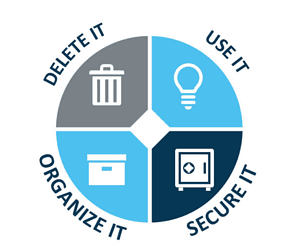Did you know that the third week of April is Organize Your Files Week? April is also Records and Information Management Month, so there’s no excuse for not getting on top of your paperwork!
Getting your files together
- Step one is collecting all of your (or your loved one’s) paperwork in one place. Try to let go of any judgement about the state of your paperwork- that’s why we’re doing this!
- Create piles:
- What needs your immediate attention?
- What needs to be saved?
- What can be tossed?
- What needs to be shredded?

Saving and filing your documents
- There are pros and cons to each storage system.
- What system works best for you?
- Binders (e.g., home binder with information about repairs and insurance; caregiving binder with financial information, etc.).
- Filing cabinet with different folders (e.g., a folder for each person in the household, a folder for paperwork related to the house, a folder for warranties, etc.).
- Using your bank’s safety deposit box (some credit unions don’t offer safety deposit boxes, so make sure this is an option if you’re interested!).
- Storing important documents in a fireproof safe or box (note: this can be an expensive option, and very heavy!).
- Scanning documents into an online platform like Evernote (note: you’ll still need to keep original copies of important documents like your birth certificate and social security card, so you won’t be able to digitize them).
Backing up documents electronically
- Click here to read our blog post on backing up documents using thumb drives/USB flash drives, your computer, CDs/DVDs, and external hard drives.
- Note: electronic backups don’t last forever! Make sure to save your information using different methods or create a backup schedule.
Recycling documents
- Papers without personal information can be recycled. This includes flyers and mailers, envelopes, and scap paper you may have scribbled notes on.
- Know what you can recycle. Most cities in Washtenaw County accept Mixed Paper Recycling, which means that all recycling is in one bin. Accepted paper could include newspapers, magazines, junk mail, regular mail, and envelopes.
- Not sure what your area accepts? Click on your area on the Washtenaw County website.
Getting rid of files safely
- Shred anything that has your personal information (name, social security number, birthday, etc.).
- In a pinch, cutting up sensitive papers and credit card offers with scissors is better than nothing.
- Don’t have a shredder at home? Find shredding services near you:
- Keep an eye out for free community shred days put on by your city or township (you usually have to be a resident of that city/township to participate).
- Horizons Planning Corporation is having a community shred day on Monday April 22nd (3-6pm). Call (734) 761-3155 for more information.
- Check your local library to see if they have a shredding day coming up.
- Corrigan Record Storage offers free community shredding on the first Saturday of each month between 9 am and Noon (located in Ann Arbor).
- Fedex offers paper shredding ($1.49 per lb. Has some limits, visit website for more information).
- Office Depot offers paper shredding ($.99 per pound for in-store shredding, usually have coupons on their website).
- Recycle Ann Arbor offers paper shredding (price varies by amount).
- The UPS Store offers paper shredding (price varies by weight, located in Ypsilanti).
- Keep an eye out for free community shred days put on by your city or township (you usually have to be a resident of that city/township to participate).
Preventing paper clutter
- Click here to read our blog post on getting off junk mail mailing lists.
- How to Organize Life’s Most Important Documents via New York Times
- Stick to your new organization system- whether it’s a binder, all electronic, or a combination of the two.






